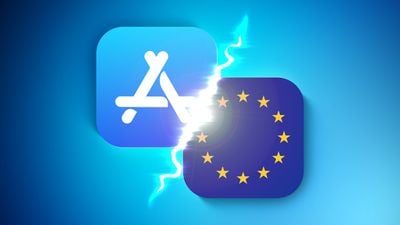iOS Apps From Alternative Marketplaces Can Be Updated for 30 Days Outside of EU
Apple today clarified that iPhone users in the European Union can continue to update and use apps from alternative app marketplaces for a 30-day period when leaving the EU.

With the release of iOS 17.4, Apple published a number of support documents, and one of the pages outlined what happens when an iPhone user with apps installed through an alternative app marketplace leaves the EU. At the time, the document said that there would be an unspecified "grace period," but Apple has now updated it to provide exact timing.
EU iPhone users who travel outside of the area can expect to be able to update apps installed through alternative app marketplaces for a 30-day period, but after that, apps will not be able to be updated.
Installing alternative app marketplaces and the apps in those marketplaces is restricted to the European Union at all times, so travelers will not be able to install new apps through a marketplace while out of their home country or one of the 27 countries in the EU. Apps that have been downloaded can continue to be opened and used, even if they can't be updated.
If you leave the European Union, you can continue to open and use apps that you previously installed from alternative app marketplaces. Alternative app marketplaces can continue updating those apps for up to 30 days after you leave the European Union, and you can continue using alternative app marketplaces to manage previously installed apps. However, you must be in the European Union to install alternative app marketplaces and new apps from alternative app marketplaces.
Apple makes it clear that iPhone users who want to install apps outside of the App Store must be physically located in a country in the European Union and their Apple ID must also be set to a country or region in the EU. Apple uses privacy-focused on-device processing to determine whether a user is eligible to install an alternative app marketplace.
Popular Stories
Despite being more than two years old, Apple's AirPods Pro 2 still dominate the premium wireless‑earbud space, thanks to a potent mix of top‑tier audio, class‑leading noise cancellation, and Apple's habit of delivering major new features through software updates. With AirPods Pro 3 widely expected to arrive in 2025, prospective buyers now face a familiar dilemma: snap up the proven...
Apple plans to release an all-new super thin iPhone this year, debuting it alongside the iPhone 17, iPhone 17 Pro, and iPhone 17 Pro Max. We've seen pictures of dummy models, cases, and renders with the design, but Lewis Hilsenteger of Unbox Therapy today showed off newer dummy models that give us a better idea of just how thin the "iPhone 17 Air" will be.
The iPhone 17 Air is expected to be ...
If you missed the video showing dummy models of Apple's all-new super thin iPhone 17 Air that's expected later this year, Sonny Dickson this morning shared some further images of the device in close alignment with the other dummy models in the iPhone 17 lineup, indicating just how thin it is likely to be in comparison.
The iPhone 17 Air is expected to be around 5.5mm thick – with a thicker ...
A developer has demonstrated Windows 11 ARM running on an M2 iPad Air using emulation, which has become much easier since the EU's Digital Markets Act (DMA) regulations came into effect.
As spotted by Windows Latest, NTDev shared an instance of the emulation on social media and posted a video on YouTube (embedded below) demonstrating it in action. The achievement relies on new EU regulatory...
While the iPhone 17 Pro and iPhone 17 Pro Max are not expected to launch until September, there are already plenty of rumors about the devices.
Below, we recap key changes rumored for the iPhone 17 Pro models as of April 2025:
Aluminum frame: iPhone 17 Pro models are rumored to have an aluminum frame, whereas the iPhone 15 Pro and iPhone 16 Pro models have a titanium frame, and the iPhone ...
Apple's iPhone development roadmap runs several years into the future and the company is continually working with suppliers on several successive iPhone models simultaneously, which is why we often get rumored features months ahead of launch. The iPhone 17 series is no different, and we already have a good idea of what to expect from Apple's 2025 smartphone lineup.
If you skipped the iPhone...
Apple seeded the third beta of iOS 18.5 to developers today, and so far the software update includes only a few minor changes.
The changes are in the Mail and Settings apps.
In the Mail app, you can now easily turn off contact photos directly within the app, by tapping on the circle with three dots in the top-right corner.
In the Settings app, AppleCare+ coverage information is more...
While the so-called "iPhone 17 Air" is not expected to launch until September, there are already plenty of rumors about the ultra-thin device.
Overall, the iPhone 17 Air sounds like a mixed bag. While the device is expected to have an impressively thin and light design, rumors indicate it will have some compromises compared to iPhone 17 Pro models, including only a single rear camera, a...























